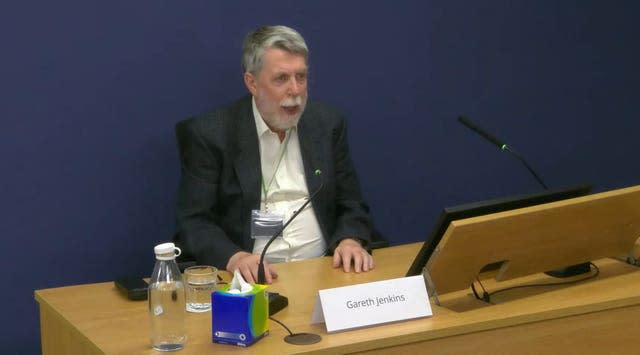Ex-Fujitsu engineer apologises for saying subpostmaster ‘jumped on bandwagon’
A former Fujitsu engineer has apologised for saying a subpostmaster saw an article which indicated the Horizon IT system was unreliable and “decided to jump on the bandwagon” while she was being prosecuted.
Gareth Jenkins sent an email on March 1 2010 discussing the case of Seema Misra, who was given a 15-month prison sentence in November of the same year, when she was eight weeks pregnant.
The email said: “When she went to court she saw an article in Computer Weekly indicating that Horizon was unreliable and she decided to jump on the bandwagon.”
He apologised during the Post Office Horizon IT Inquiry on Thursday, saying “that’s totally inappropriate wording on my part for which I apologise”.
Mr Jenkins worked at Fujitsu, formerly known as International Computer Ltd, for the whole of his professional career before retiring in 2015, and had been a “distinguished engineer” since the mid-1990s.
His evidence about the Horizon system was used in the prosecutions of many subpostmasters, including Ms Misra.
Previous witnesses to the inquiry claimed Mr Jenkins may have committed perjury due to his failure to disclose knowledge of bugs in the Horizon system to subpostmasters.
He is being investigated by the Metropolitan Police on suspicion of perjury and perverting the course of justice.
Another email was shown to the inquiry in which Mr Jenkins commented on a report and said “this is another example of postmasters trying to get away with ‘Horizon has taken my money'”.
Mr Jenkins said: “That’s me very poorly trying to summarise what I thought was being laid out in the email trail below and I apologise for the wording that I used there.”
Asked by inquiry counsel Jason Beer KC if he believed there were “many examples of subpostmasters ‘trying to get away with Horizon has taken my money'”, Mr Jenkins said: “I can’t remember what I believed.”
Put to him that it reflected his mindset at the time, Mr Jenkins said: “I didn’t believe that there was any problems with Horizon that were causing Horizon to lose money.”

In another email, Mr Jenkins was commenting on a separate report when he said “we don’t really want to be seen to be undermining a POL (Post Office) prosecution!”.
The email, sent on January 27 2010, said: “I agree there probably needs to be some further investigation here. However I’m also aware that this is potentially highly political, therefore I’m not sure how best to address this. We don’t really want to be seen to be undermining a POL prosecution!”
Mr Jenkins said he was “wanting guidance as to what actually we should be doing”.
Asked by Mr Beer whether he received guidance from management on “whether you should tell the truth or not”, Mr Jenkins said: “No, I didn’t need guidance, I would just tell the truth but I wanted to make sure that I was being covered by my management for any actions I took.”
He said it seemed “totally illogical” to mention problems identified in Horizon Online when discussing a legacy Horizon case.
Put to him that he did not reveal the existence of the bug in his witness statements, Mr Jenkins said: “No, because it was totally irrelevant. It was a totally separate system.”
He added: “It never occurred to me that anything to do with Horizon Online was anything to do with legacy Horizon.”
Mr Beer asked: “It didn’t occur to you to ask whether you should reveal it?”

He said: “No, it just seemed totally illogical to me.”
On Wednesday, Mr Jenkins admitted it was “inappropriate” for him to modify a draft witness statement to remove a reference to weaknesses in the Horizon system at the request of the Post Office.
A Post Office investigator had warned the company could be “embarrassed at court” if an acknowledgement of the software’s failures featured in the statement, which was requested in connection with allegations made against a subpostmaster in 2006.
Mr Jenkins also told the inquiry he thought any remote access would have been visible to subpostmasters and could be distinguished from changes made by third parties, although he acknowledged he knew it was “theoretically possible” this might not always be the case.
In his third witness statement for the inquiry, Mr Jenkins claimed Post Office lawyer Warwick Tatford had looked over a draft of his witness statement for Mrs Misra’s trial and recommended he “make some points more strongly in favour of the Post Office”.
Mr Tatford “wanted me to say it looked as though Mrs Misra had stolen money rather it was incompetence”, Mr Jenkins wrote.
On Tuesday, he told the inquiry he did not recall receiving a letter from law firm Bond Pearce sent to Fujitsu in 2005 laying out the duties of an expert witness, and said he would “have done things differently” in later cases – including that of Ms Misra – if he had.
More than 700 subpostmasters were handed criminal convictions between 1999 and 2015 when errors in the Horizon IT system meant money appeared to be missing from many branch accounts when it was not.
It has been branded the biggest miscarriage of justice in British legal history.
Mr Jenkins is due to give evidence for four consecutive days up to Friday, the longest run of questions any witness has faced so far.
The inquiry continues.


